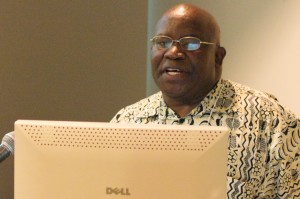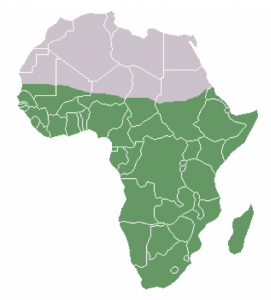Presenter
Ezra Ondari-Okemwa, Senior Lecturer and Head, Department of Library and Information Sciences, University of Fort Hare, South Africa.
Session Overview

Dr. Ondari-Okemwa introduced his talk by explaining that his research specifically focused upon the sub-Saharan region of Africa during its most productive period in terms of knowledge production, 1996-2007. The level of scholarly publication in sub-Saharan Africa is of critical importance, as this activity enables scholars to share what they know with their peers within the region. Such activity, researchers in sub-Saharan Africa can create new knowledge rather than only relying on scholarly research that emanates from the developed world.

Ondari-Okemwa’s called into question the accuracy of indicators of scholarly publication from sources such as Thomson Reuters as its data focuses predominantly upon publications from North America, Europe as well as publications in the English language. He also identified that knowledge production was not uniform and took at least two dominant modes, only one of which benefited from the funding sources typically available to African researchers. The first mode of knowledge production is a linear one, one that is almost exclusively academic, investigator focused and discipline based. This mode of knowledge production leans heavily on scholarly publication. The second mode, one that started to emerge in the mid-twentieth century is far more context and problem-focused, with an interdisciplinary and reflexive orientation. This mode leans more towards the types of knowledge production we see in emerging interdisciplinary academic disciplines such as Developmental Studies, Knowledge Management and Gender Studies. This latter mode, seems particularly under-represented in the data on sub-Saharan African scholarly production, in part because funding sources are less likely to be found for such research in the social sciences than, in say, Medicine or Science. As such, the majority of the scholarly publications that were published during the time-period of the study (1996-2007) show a strong emphasis on science-based disciplines. Other disciplines were not widely represented.
Ondari-Okemwa also spoke to the potential benefits of Open Access and electronic journals in the context of scholarly activities in sub-Saharan Africa, specifically, and in Africa in general. Without question, the availability of such resources has had a positive impact on the research connections between the leading institutions. Such resources can be readily and exhaustively searched, readers can quickly move from citations to the cited works themselves with a single click, and the full range of bibliographic references are easily available and retrievable. However, a general state of technological deprivation in sub-Saharan Africa excludes most scholars from contributing to knowledge production in the region.
Ondari-Okemwa identified several key hurdles to scholarly publishing and knowledge production in Sub-Saharan Africa:
- There is little or no use of locally produced knowledge
- Invisibility of scholarly publications emanating from sub-Saharan Africa
- Technological hurdles such as poor Internet connectivity and low teledensity
According to Ondari-Okemwa, governments in sub-Saharan Africa need to address issues such as low and eroding salaries, social unrest and political conflicts including war, to address the reasons why so many people leave the region. In concluding, Ondari-Okemwa acknowledged the many strategic challenges facing most institutions of research and learning in sub-Saharan Africa, but felt strongly that steps needed to be taken to ensure higher rates of production of knowledge. These local scholars must play a role in this as they are best-placed to produce such knowledge about the region.
Question period
During the question period, several issues raised by the audience focused upon infrastructure challenges within African universities and the pressure upon scholars within those institutions to conduct their research in areas of interest to the developed world. Many in the room made reference back to the hurdles to scholarly publishing earlier mentioned by Ondari-Okemwa and to the fact that connectivity is a critically important factor that is limiting the possibilities for universities throughout Africa to engage more fully in research activities. With respect to funding for research, one audience member questioned whether or not the World Bank model of development really calls for the production of new knowledge from African countries. More often, it seems to narrowly task universities to reproduce existing research and to focus instead on increasing numbers of graduates in areas that align with its definitions of economic growth in the region. Ondari-Okemwa acknowledged that universities were increasingly being asked by government to shift to the mass production of graduates. The universities are caught up in a struggle with increasing enrolments without a concomitant increase in funding sources, and this results in fewer opportunities for scholars to focus on research activities.
Another issue that came up during the question period concerned the invisibility of many African scholarly journals. There are hundreds of journals that are not online and not visible being hidden within institutions and only available to a limited number of scholars and readers. Ondari-Okemwa responded by saying that it will be difficult to change this situation, though initiatives like African Journals Online is helping to make African journals more visible.
Related Links
Ondari–Okemwa, E. (2007). “Scholarly publishing in sub–Saharan Africa in the twenty–first century: Challenges and opportunities.”
First Monday, Volume 12 Number 10 – 1 October 2007
Ondari-Okemwa, E. (2004). Impediments to promoting access to global knowledge in sub-Saharan Africa. Library Management, 25(8/9):361-375.
Ondari-Okemwa, E. (2002). Challenges of harnessing virtual information resources: the case of the African Virtual University. Journal of Information Science 28(4): 321–329.